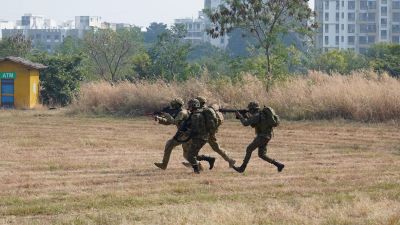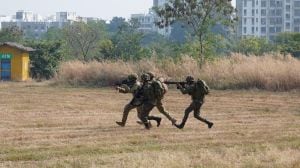The post-Saddam moment
LET us remember that not just the removal, but the arrest or destruction of Saddam Hussein, was the declared policy objective of the Bush ad...

LET us remember that not just the removal, but the arrest or destruction of Saddam Hussein, was the declared policy objective of the Bush administration when it launched Gulf War Two earlier this year. The delay in the capture of the former Iraqi president had therefore considerably affected US President George W. Bush’s own credibility. Given this background, Saddam Hussein’s recent capture has considerably improved, not just Bush’s personal chances of getting re-elected in 2004, but the validity of America’s policies vis-a-vis Iraq.
Of course, the original reason for launching the war was the alleged presence of weapons of mass destruction in Iraq. Basically, however, it was the Saddam Hussein government’s suspected connections with militant groups that had singled him out as a target of US intervention. After Gulf War One, Saddam Hussein had been following an anti-America policy consistently and had become a major factor in the support extended to anti-Israeli policies in the Middle East. Given these factors, the recent development is certainly a shot in the arm for America and a plus point for its anti-terrorist campaign.
The question, of course, is what impact will this have on the Arab world? It would, possibly, provoke two reactions. One, the fact that the US remains committed to carrying on with its campaign against these terrorist elements, will make other Arab governments which are involved directly or indirectly with militant groups in the region, to be more cautious about articulating views against the US or adopting policies which may challenge American interests.
Secondly, there is the question of public opinion within Muslim countries themselves. Public opinion in Iraq has been divided. While people may have been happy about Saddam Hussein’s capture, the opposition to America’s continued military and political presence remains as alive as ever. Certainly, Saddam Hussein’s capture will not — in the short term at least — reduce violence in that country. But, at the same time, the fact that Saddam Hussein is now in the custody of the United States will encourage all those in Iraq who were earlier unwilling to join the new interim government to reconsider their stand, given that it will now be more safe to do so. Consequently, policies for infrastructural reconstruction, as well as political and economic revival may now be given a fillip.
While Saddam Hussein’s capture may well have brought relief at the governmental level in various Islamic countries, public opinion in the region at the emotional level would continue to have an undercurrent of resentment against the Americans. They will also now be a groundswell of opinion the world over in favour of American now handing over the remaining processes of the stabilisation process of Iraq to the United Nations, or some UN-sponsored organisation.
Saddam Hussein’s capture — and the comparative stabilisation it could entail — would reduce the internal dissension within NATO countries, vis-a-vis Iraq. It may also have a positive impact on the anti-terrorist campaign in Afghanistan and should give America more confidence in now going about the capture of Osama bin Laden. This will result in increased US pressure on both Pakistan
and Pervez Musharraf to help in this process.
So how should India respond to the changed situation? First and foremost, it should not express any opinion on Saddam Hussein’s capture. We were not part of the coalition which operated against Saddam Hussein and that was because of a deliberate decision taken by this country. If we are pressed for an opinion, India’s attitude should be that now that he has been captured, the legal process should be allowed to take its course — within the parameters of international law. Also, we must not express any opinion on where his trail should be held.
If, as a result of Saddam Hussein’s capture, a more legitimate Iraqi government comes into being, India should be willing to partake in the activities connected with the reconstruction and development of the country. And if the Americans and their allies make arrangements for the future stabilisation of Iraq under the umbrella of the UN, or any entity nominated by the UN, India should be willing to cooperate in even ensuring the security arrangements within Iraq.
Our basic objectives in relation to Iraq must always be kept in mind. These are, first of all, that we wish the return of the sovereignty of Iraq to the Iraqi government. Two, that we desire the full restoration of democracy in that country. Three, that our primary relationship is with the people of Iraq, who have been supportive of India on many critical issues in the region. We should help them come back into their own, in both political and economic terms.
Indeed, India has a great deal to offer in this regard. It has, given its recent history, vast experience in managing a developing economy and has evolved innumerable and varied kinds of training programmes necessary for reconstruction activities. This is something Iraq needs at this juncture, and it could give India an opportunity to be of assistance to that beleaguered nation. But we should, at the same time, be conscious of public opinion and responses to such interventions within Islamic nations. One way to address this would be to take steps to reassure these countries that our relations, at the substantive level, are aimed at the well-being of the Iraqis and the stabilisation of a cooperative relationship between Iraq and India.





- 01
- 02
- 03
- 04
- 05


























